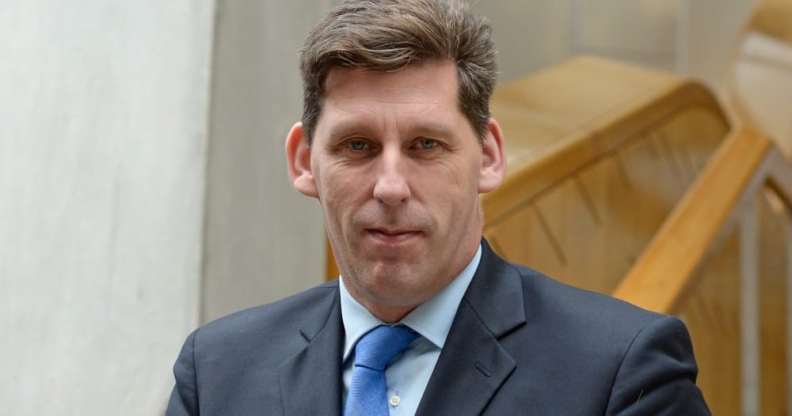Deputy House of Lords speaker opens up about losing trans brother to ovarian cancer

Ian Duncan, Baron Duncan of Springbank (Ken Jack/Corbis/Getty)
The deputy speaker of the House of Lords, Ian Duncan, has spoken poignantly of losing his trans brother to ovarian cancer, aged 48.
Baron Duncan of Springbank, former minister for climate change and minister in the Northern Ireland Office, opened up about his older brother Sean in an interview with i.
He recalled Sean’s battle as a transgender man, fighting a cancer that predominantly affects women, in the hope that it will prevent others in the trans community from dying as his brother did.
“If you are content with who you are, having begun to transition, it’s very hard to think about the bits inside,” he said. “You would not have been thinking that that was something that needed to be checked. The idea of what’s under the skin probably wasn’t a thing that had registered [with Sean].”
He acknowledged that he is sparking this conversation in “a challenging time for trans folk; they’re up against such stirred-up animosity”. Much of this comes in heated rows surrounding healthcare, with cancer charities and services met with a barrage of abuse for including trans people in their messaging.
Just last year one British gynaecological cancer charity, The Eve Appeal, was forced to delete a trans-inclusive post stating that “everyone with a cervix” should have access to cervical cancer screenings after it attracted “vile” harassment online.
Cases like this add additional hurdles to what is already a difficult issue for trans people, for whom the prevention of certain types of cancer means “having to recognise that the legacy of a former self may still be part of their world”, Duncan said.
‘Time slipped away’
Lord Duncan’s brother Sean began medically transitioning in the 1990s, long before any media representation of transgender men. Afterwards he emigrated to Virginia to live with his new partner, an American nurse, leaving Britain before he’d had any internal surgeries to remove his uterus or ovaries.
He lived happily for years with the comfort that comes with a long-term relationship – until it all came crashing down.
“He was very nearly getting the whole package together,” said Duncan. “And then it was blown apart by a legacy of his former self.”
Sean didn’t have proper immigration status, so he couldn’t work, and without work he couldn’t afford proper health insurance. “The great tragedy of it was that [his cancer] needed to be detected earlier in the US,” Duncan said.
In 2007, Sean phoned his brother to deliver the news. “Sean said it was ovarian cancer,” he said. “I remember thinking, ‘That must be very difficult to deal with because of who you are.'”
He had chemotherapy and operations to remove the cancer, and for a time it seemed to have worked. Sean moved on with life, trying to think of the disease as little as possible.
“It was more [like], ‘Once it’s cut out it will be done. Then we’ll be through the dark.’ That sort of approach,” Duncan suggests.
But tragically, just as Sean’s health appeared to be improving, things started to unravel again as his marriage broke down and he returned to the UK.
“He hadn’t been as attentive to his health,” Duncan told i. “The cancer came back, full force. It spread and could not respond to treatment.”
Trans healthcare barriers
Trans men and non-binary people are known to face unique barriers and stigma when accessing gynaecological healthcare like smear tests and are less likely to be up to date with them, risking worse health outcomes as a result.
“Even in the absence of overt discrimination, transgender and non-binary people face challenges related to structural discrimination, or cis-normativity – the assumption that all individuals are cisgender and the ways in which the social world is constructed to address the needs of cisgender people and to encourage conformity with such norms,” said Dr Crissman and Dr Stroumsa, clinical lecturers and fellows at the University of Michigan.
They report that many trans and non-binary people avoid having pelvic exams “due to fear, secondary to personal or collective trauma in healthcare settings”.
Duncan suspects his brother wasn’t going for regular cancer screenings before his death, perhaps for these reasons.
At this time he was estranged from Sean after a family row – “trivial now, in hindsight” – so by the time he found out about Sean’s condition, it was too late. He got the call from a cousin when his brother was already on his death bed; there was no time to reunite.
“It was very quick, within days of me knowing. It was shocking,” he recalled. “A shock on lots of different levels. Shocking because you never think you’re going to lose a sibling – you think that they’re there forever.
“Also we had unfinished business, we’d not had the right level of communication. The things that should have been spoken of never were. Time slipped away.”
Trans people must be included in cancer awareness
Now, as he reaches the same age his brother was when he died, Lord Duncan is urging the trans community to go for a cancer check up and urge their loved ones to do the same.
While Sean’s loss will never leave him, he fears for the lives of others like his brother. But he recognises that part of the problem lies in the wider context of healthcare which often excludes trans people from conversations such as these.
“Our healthcare system has a long way to go to help,” Duncan admitted. He says there needs to be a new language, a way of discussing cancer that affects trans people – along with education.
“It’s about bringing together the right groups to work out how to improve health awareness, how to recognise the importance of testing in the right way, irrespective of who you are.”

